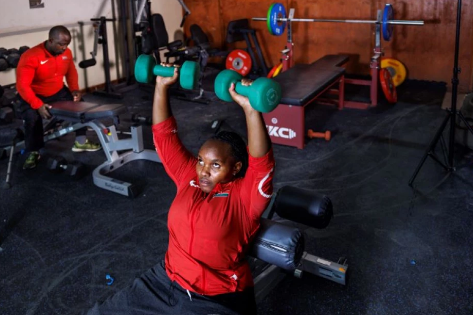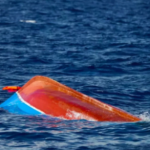In a dimly lit, claustrophobic room within a Nairobi stadium, the petite Kenyan Paralympian, Hellen Wawira Kariuki, effortlessly powerlifts nearly double her weight. Her coach stands nearby, offering words of encouragement as she pushes through her routine without breaking a sweat.
“Sixty kilos is still warming up,” grinned the 32-year-old, who qualified for the Paris Games that open next week in the para-powerlifting under 41-kilo category.
“The sport has helped me to have courage which I did not have before,” Wawira told AFP.
Kenyan Paralympian Hellen Wawira Kariuki, who was born with spina bifida, a congenital spinal condition, finished fifth at the 2021 Tokyo Paralympics. Now, as she prepares for her next competition, she remains hopeful, saying, “I hope to win any medal because anything can happen.”
Her journey into powerlifting began by chance in 2012. Unable to afford university, Wawira found herself at home in Embu, 125 kilometers northeast of Nairobi. For three years, she helped with household chores until a friend suggested she try powerlifting—a decision that initially alarmed her parents, who were concerned about the physical strain.
Despite starting out with a rudimentary homemade bench, Wawira managed to achieve a respectable finish in Tokyo, lifting 95 kilos. Her accomplishments have only grown since then, culminating in a bronze medal at the 2022 Commonwealth Games in Birmingham, England.
Following her success, Wawira’s training conditions have improved. With partial funding from the Kenyan government, she now trains two hours a day at the gym in Nairobi’s Nyayo National Stadium. She dismisses the idea that European athletes have a financial edge, smiling as she says, “We use the same training bench.”
However, her coach of seven years, David Waore, doesn’t entirely share her view.
“They only have to concentrate on sport,” he told AFP, whereas he and Wawira needed “side hustles” to survive financially.
But despite the obstacles, he said he is convinced that Wawira can win a medal when her event takes place on September 4 in Paris.
“She will do it, I know,” he said, before exhorting her in a patter of Swahili, “twende, twende” (come on, come on), as she benched 80 kilos.
Lifting double her own body weight has helped Wawira feel “strong and powerful”.
Through her journey, she said she hopes to change the way disability in the East African country is viewed, where “society does not really accept us”.
“Living with a disability in Kenya is not easy,” said Wawira, who uses a wheelchair.
And although she is currently focused on her medal-winning ambitions, she has one eye on the future too.
“My dream is to create a foundation after I retire. A foundation to nurture young talents who live with disabilities in Kenya so that they can support themselves.”
Perhaps, she said, one day, “there may be someone who admires me and aspires to do what I do”.



